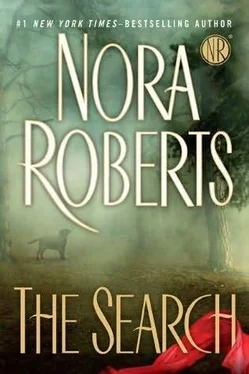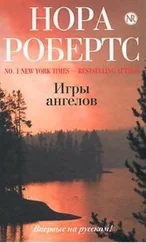“Honestly, I think I’m going to open a can of soup, then go to bed. I didn’t get much sleep last night.”
“I worry about you, Fee.” She gave Fiona’s tail of hair a little tug. “Why don’t you come stay with me until they catch this maniac?”
“You know I’m fine. Me and the boys. Besides, the maniac’s not interested in me.”
“But—” She broke off when the door opened.
“Hi, Sylvia. Hi, Fiona.”
“Jackie, how are you?” Sylvia smiled at the pretty blonde who ran a local B&B.
“I’m just fine. I meant to get in earlier. I know you close in a few minutes.”
“Don’t worry about that. How’s Harry?”
“Tucked up in bed with a cold—which is one of the reasons I ran out. I swear you’d think he had the plague instead of the sniffles. He’s driving me crazy. I’ve been doing a little early spring cleaning between waiting on him hand and foot and listening to him moan. I decided I need to spruce the place up a little, do some redecorating. Mind if I look around, get some ideas?”
“You go right ahead.”
“I’d better get going. Nice to see you, Jackie.”
“You, too. Oh, Fiona, my boy and his wife just got a puppy. Practice, they say, before they start working on making me a grandmother.” She rolled her eyes.
“That’s nice. What kind did they get?”
“I don’t know. They went to a shelter.” She smiled then. “Brad said they’d save a life, then start thinking about starting one.”
“That’s really nice.”
“They named her Sheba—as in Queen of. He said if I ran into you I should tell you they’re going to sign up for your puppy classes.”
“I’ll look forward to it. I’d better go.”
“I’ll come by tomorrow, give you a hand with your classes,” Sylvia told her. “Oreo could use a little refresher course.”
“I’ll see you then. Bye, Jackie.”
As she walked out she heard Jackie exclaim over the bench, “Oh, Sylvia, this is a wonderful piece.”
“Isn’t it? It’s by the new artist I told you about. Simon Doyle.”
Fiona grumbled all the way to the truck.
In his cell in Washington State Penitentiary, George Allen Perry read his Bible. While his crimes had earned him a maximum-security cage for the rest of his life, he was considered a model prisoner.
He joined no gangs, made no complaints. He did the work assigned to him, ate the food served him. He kept himself clean, spoke respectfully to guards. He exercised regularly. He did not smoke or swear or use drugs, and spent most of the endless days reading. Every Sunday he attended services.
Visitors came rarely. He had no wife, no child, no staunch friends outside, or inside, the walls.
His father had long ago deserted him, and his mother, who the psychiatrists agreed was the root of his pathology, feared him.
His sister wrote him once a month, and made the long trek from Emmett, Idaho, once a year, considering it her Christian duty.
She’d given him the Bible.
The first year had been a misery that he’d borne with downcast eyes and a quiet manner that had disguised a raging fear. In the second year he’d lost fear in depression, and by the third he’d accepted that he would never be free.
He would never again be free to choose what to eat, and when to eat it, to rise or repose at his own whim. He would never again walk through a forest or glade or drive a car along a dark road with a secret in the trunk.
He would never again feel the power and the peace of a kill.
But there were other freedoms, and he earned them carefully. Meticulously. He expressed regret for his crimes to his lawyer, to the psychiatrist.
He’d wept, and considered the tears humiliation well spent.
He told his sister he’d been born again. He was allowed private consultation with a minister.
By his fourth year, he was assigned to the prison library, where he worked with quiet efficiency and expressed gratitude for the access to books.
And began his search for a student.
He applied for and was granted permission to take courses, both by visiting instructors and by video feed. It gave him an opportunity to interact with and study his fellow inmates in a new setting.
He found most too crude, too brutal, too lacking in intellect. Or simply too old, too young, too deeply entrenched in the system. He continued to further his education—he found it interesting—and he held to the thinning hope that fate would offer him the spiritual freedom he sought.
In his fifth year in Walla Walla, fate smiled on him. Not in the guise of a fellow inmate, but an instructor.
He knew instantly, just as he’d known the woman he would kill the moment he saw her.
This was his gift.
He began slowly, assessing, evaluating, testing. Patient, always, as he outlined and refined the methods by which he would create his proxy, the one who would walk outside the walls for him, hunt for him and kill for him.
Who would, in time, in good time, correct his single mistake. One that haunted him every night in the dark cage where silence and comfort were strangers.
Who would, in time, kill Fiona Bristow.
That time, Perry thought as he read Revelation, was nearly here.
He glanced up as the guard came to the cell. “Got a visitor.”
Perry blinked, carefully marking his place before setting aside the worn Bible. “My sister? I didn’t expect her for another six weeks.”
“Not your sister. FBI.”
“Oh, my goodness.” A big man with thinning hair and prison pallor, Perry stood meekly as the door clanged and slid open.
Two guards flanked him, and he knew others would search his cell while he was gone. No matter, none at all. They’d find nothing but his books, some religious tracts, the dry, God-fearing letters from his sister.
He kept his head down, repressed the smile that strained to spread over his face. The FBI would tell him what he already knew. His student had passed the next test.
Yes, Perry thought, there were many kinds of freedom. And at the thought of gaming with the FBI again, he took wing and soared.
Grateful for the bright, brisk morning and work that demanded her full attention, Fiona studied her advanced special-skills students. Today was a very big day for dogs and handlers. They’d attempt their first blind search.
“Okay, the victim’s in place.” She thought of Sylvia, three-quarters of a mile away, sitting cozily under a forked-trunk cedar with a book, a thermos of herbal tea and her radio. “I want you to work as a unit. We’re going to use the sector system. You can see I’ve set up the base.” She gestured to a table she’d placed under a pole tarp and the equipment on it. “For today, I’ll handle base and stand as operational leader, but by next week I want you to elect your officers.”
She gestured to the whiteboard under the tarp. “Okay. The local authorities have notified the operations officer—me, in this case—and asked for assistance in the search and rescue of an adult female hiker who’s been lost approximately twenty-four hours. You see on the board temperatures last night dropped to forty-three degrees. She has only a day pack, and little experience. The victim is Sylvia Bristow.”
That brought out some grins as the class knew Sylvia as Fiona’s sometime assistant. “She’s age-deleted for my own well-being, Caucasian, brown hair, brown eyes, five feet, five inches, and about a hundred and thirty pounds. When last seen she was wearing a red jacket, jeans, a blue baseball-style cap. Now, what do you need to know before being given your sectors?”
She answered with details from the scenario she’d devised. The subject was in good health, had a cell phone but often neglected to charge it, had been expected to hike two to four hours, was not local and had only recently taken up hiking.
Читать дальше












